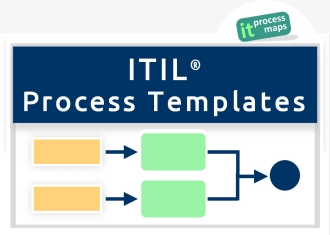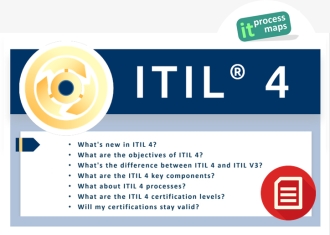Checklist Capacity Plan: Difference between revisions
mNo edit summary |
No edit summary |
||
| Line 7: | Line 7: | ||
<br style="clear:both;"/> | <br style="clear:both;"/> | ||
<p> </p> | |||
''' | '''ITIL Process''': [[ITIL V3 Service Design]] - [[Capacity Management]] | ||
''' | '''Checklist Category:''' [[ITIL-Checklists#Checklists ITIL V3 Service Design|Checklists ITIL V3 Service Design]] | ||
'''Source''': Checklist "Capacity Plan" from the [https://en.it-processmaps.com/products/itil-process-map.html ITIL Process Map V3] | |||
<p> </p> | |||
The Capacity Plan contains | The ''Capacity Plan'' is used to manage the resources required to deliver IT services. The plan contains scenarios for different predictions of business demand, and options with cost estimates to deliver the agreed service level targets. | ||
<p> </p> | |||
'' Typically, the Capacity Plan contains the following information:'' | |||
<p> </p> | |||
# '''''Business scenarios''''' | |||
## Known business initiatives | |||
### Description of the initiative | |||
### Likely impact on service/ resource capacity and performance | |||
### Proposed measures to cope with extra demand for IT services and resources | |||
#### Medium- to long-term proposals | |||
#### Short-term measures (details on ongoing measures or proposals entering the concrete planning phase are included in [[Checklist Capacity Plan#adjust service capacity and performance|section 4]] of this template) | |||
## Known business volume forecasts | |||
### Affected service(s) | |||
### Type of business volume | |||
### Likely impact on service/ resource capacity and performance | |||
### Proposed measures to cope with extra demand for IT services and resources | |||
#### Medium- to long-term proposals | |||
#### Short-term measures (details on ongoing initiatives or proposals entering the concrete planning phase are included in [[Checklist Capacity Plan#adjust service capacity and performance|section 4]]) | |||
# '''''Forecast of service utilization and performance''''' (this section includes details an all service levels monitored by [[Capacity Management]]) | |||
## Assumptions and data on which the forecast is based | |||
### Trends in service utilization and performance based on current and historic data (short-, medium- and long-term) | |||
### Capacity and performance thresholds about to be reached | |||
### Exceptional deviations from the baseline | |||
### Forecast data for service utilization from the business side | |||
## Short-, medium- and long-term forecasts for service utilization and performance | |||
## Proposed measures to cope with extra demand for IT services and resources | |||
### Medium- to long-term proposals | |||
### Short-term measures (details on ongoing initiatives or proposals entering the concrete planning phase are included in [[Checklist Capacity Plan#adjust service capacity and performance|section 4]]) | |||
# '''''Forecast of resource utilization and performance''''' (this section includes details an all IT resources/ components monitored by [[Capacity Management]]) | |||
## Assumptions and data on which the forecast is based | |||
### Trends in resource utilization and performance based on current and historic data (short-, medium- and long-term) | |||
### Capacity and performance thresholds about to be reached | |||
### Exceptional deviations from the baseline | |||
### Forecast data for service utilization from the business side | |||
## Short-, medium- and long-term forecasts for resource utilization and performance | |||
## Proposed measures to cope with extra demand for IT resources | |||
### Medium- to long-term proposals | |||
### Short-term measures (details on ongoing initiatives or proposals entering the concrete planning phase are included in [[Checklist Capacity Plan#adjust service capacity and performance|section 4]]) | |||
# <span id="adjust service capacity and performance">'''''Overview of planned and ongoing initiatives to adjust service capacity and performance'''''</span> | |||
## Service name | |||
## Person in charge of the service | |||
## Person in charge of the initiative to adjust capacities/ performance | |||
## Reason/ business case for the measure | |||
## Details on the measure | |||
### Affected infrastructure components | |||
### Activities to be carried out | |||
### Time schedule | |||
### Costs and resources | |||
### Possible alternatives | |||
### Current status | |||
<p> </p> | |||
<!-- This page is assigned to the following categories: --> | <!-- This page is assigned to the following categories: --> | ||
Revision as of 18:17, 28 September 2011
<seo metakeywords="capacity plan template, itil capacity plan template, itil capacity plan example" metadescription="The Capacity Plan contains summarizing information about identified measures, aimed at introducing the necessary adjustments to IT Service capacities ..." />

ITIL Process: ITIL V3 Service Design - Capacity Management
Checklist Category: Checklists ITIL V3 Service Design
Source: Checklist "Capacity Plan" from the ITIL Process Map V3
The Capacity Plan is used to manage the resources required to deliver IT services. The plan contains scenarios for different predictions of business demand, and options with cost estimates to deliver the agreed service level targets.
Typically, the Capacity Plan contains the following information:
- Business scenarios
- Known business initiatives
- Description of the initiative
- Likely impact on service/ resource capacity and performance
- Proposed measures to cope with extra demand for IT services and resources
- Medium- to long-term proposals
- Short-term measures (details on ongoing measures or proposals entering the concrete planning phase are included in section 4 of this template)
- Known business volume forecasts
- Affected service(s)
- Type of business volume
- Likely impact on service/ resource capacity and performance
- Proposed measures to cope with extra demand for IT services and resources
- Medium- to long-term proposals
- Short-term measures (details on ongoing initiatives or proposals entering the concrete planning phase are included in section 4)
- Known business initiatives
- Forecast of service utilization and performance (this section includes details an all service levels monitored by Capacity Management)
- Assumptions and data on which the forecast is based
- Trends in service utilization and performance based on current and historic data (short-, medium- and long-term)
- Capacity and performance thresholds about to be reached
- Exceptional deviations from the baseline
- Forecast data for service utilization from the business side
- Short-, medium- and long-term forecasts for service utilization and performance
- Proposed measures to cope with extra demand for IT services and resources
- Medium- to long-term proposals
- Short-term measures (details on ongoing initiatives or proposals entering the concrete planning phase are included in section 4)
- Assumptions and data on which the forecast is based
- Forecast of resource utilization and performance (this section includes details an all IT resources/ components monitored by Capacity Management)
- Assumptions and data on which the forecast is based
- Trends in resource utilization and performance based on current and historic data (short-, medium- and long-term)
- Capacity and performance thresholds about to be reached
- Exceptional deviations from the baseline
- Forecast data for service utilization from the business side
- Short-, medium- and long-term forecasts for resource utilization and performance
- Proposed measures to cope with extra demand for IT resources
- Medium- to long-term proposals
- Short-term measures (details on ongoing initiatives or proposals entering the concrete planning phase are included in section 4)
- Assumptions and data on which the forecast is based
- Overview of planned and ongoing initiatives to adjust service capacity and performance
- Service name
- Person in charge of the service
- Person in charge of the initiative to adjust capacities/ performance
- Reason/ business case for the measure
- Details on the measure
- Affected infrastructure components
- Activities to be carried out
- Time schedule
- Costs and resources
- Possible alternatives
- Current status






